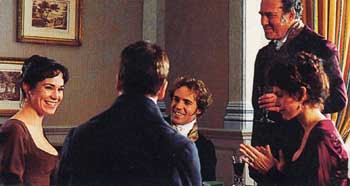 Welcome to the October meeting of the Jane Austen Movie Club! The first Tuesday of every month, Risky Regencies is the place to be for daring discussion and dastardly debate about Jane Austen film and television adaptations!
Welcome to the October meeting of the Jane Austen Movie Club! The first Tuesday of every month, Risky Regencies is the place to be for daring discussion and dastardly debate about Jane Austen film and television adaptations!
This month: the 1999 Patricia Rozema film of MANSFIELD PARK.
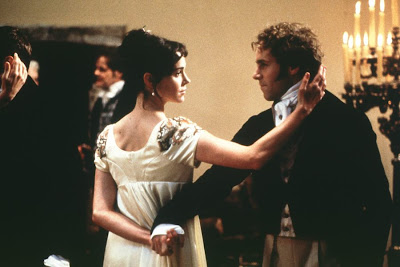 First, a word of caution: I know a lot of us have very strong views on this movie, so let’s be sure to remain polite and respectful at all times!
First, a word of caution: I know a lot of us have very strong views on this movie, so let’s be sure to remain polite and respectful at all times!
Discuss any aspect of the film that you like — but, in case it helps to get the dicussion going, here are a few questions you may or may not want to think about:
If you’ve read the novel, what did you think of it? Do you think it would be possible to do an adaptation that (a) is faithful, (b) works cinematically, and (c) is also interesting/pleasing to modern viewers? Why or why not?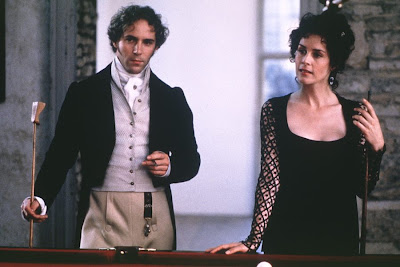
Did you think Alessandro Nivola and Embeth Davidtz were well-cast as the Crawfords? Did you find them attractive? Dangerous? Sympathetic?
What did you think of the character of Fanny, and of Frances O’Connor’s performance? If you’ve read the book, what do you think of the changes? If you haven’t, did you like the character? Did she seem true to the period?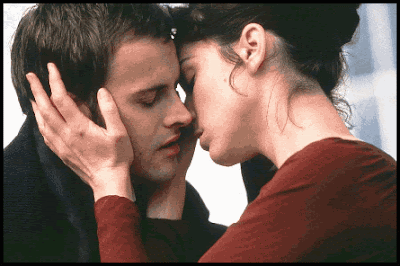
What did you think about Jonny Lee Miller as Edmund? Did he seem a good match for Fanny, or did you wish she had someone more strong/manly/perceptive/handsome/anything else?
What did you think of the “feminist” subtext? Do you think the movie Maria was plausibly a victim?
If you’ve read the book, what did you think of the way Rozema turned some characters more “good” or sympathetic (e.g. Tom) or less (e.g. Sir Thomas)? If you haven’t read the book, did you find these characters believable? Did they fit well into the story?
And, of course, ask or answer any other question that interests you!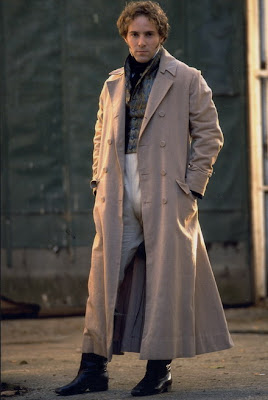 Now, to help jog everyone’s memory, here’s a partial cast list:
Now, to help jog everyone’s memory, here’s a partial cast list:
Written & Directed by Patricia Rozema
CAST:
Fanny Price: Frances O’Connor
Edmund Bertram: Jonny Lee Miller
Tom Bertram: James Purefoy
Maria Bertram: Victoria Hamilton
Julia Bertram: Justine Waddell
Sir Thomas Bertram: Harold Pinter
Mrs. Price/Lady Bertram: Lindsay Duncan
Mrs. Norris: Sheila Gish
Mary Crawford: Embeth Davidtz
Henry Crawford: Alessandro Nivola
Mr. Rushworth: Hugh Bonneville
And if you have any suggestions for what we should discuss next time, suggest away!
All comments welcome!
Cara
Cara King, author of MY LADY GAMESTER and Jane Austen movie junkie

I’ve not seen this movie, so I’m going to sit back and read all the comments. 😉
~Andrea
I can’t tell you how much I loathe this movie. I saw it for the first time when it first came out and I had just started to read Mansfield Park. I found it disconcerting the changes that the director made in Fanny’s character. She seemed less like the Fanny in the book, and more like Jane Austen, which totally misses the point. I loved Embeth Davidtz however as Mary Crawford (in that black lace dress) and Alessandro Nivola as Henry. I’ve always wondered about Henry Crawford and his motivatiosn for running off with Maria Bertram, after proposing to Fanny. I didn’t like Jonny Lee Miller as Edmund, and I thought the whole slavery issue with Sir Thomas was incredibly heavy-handed. But in the interest of being fair, I actually went and watched the movie again, and my feelings haven’t changed. I still don’t like it. I know that Fanny is sort of passive in the books, but there had to have been a way to make her more dynamic without turning her into Jane Austen, just because Fanny was her favorite heroine. However, I’m looking forward to seeing what the new version with Billie Piper is like.
I’m also not fond of this movie. When I first saw it, I wondered why Rozema would bother adapting a book she obviously did not like at all. Then I rewatched it this weekend, and realized I still do not like it. 🙂
The cast is very good, and I wish I could have seen them in a better adaptation! Elizabeth, you are right that the abolition stuff is heavy-handed and very tacked-on. And if Fanny HAS to write Austen stuff, why does she stick with the juvenilia when she is grown? 🙂
The thing I objected to the most was that the Fanny/Crawford relationship was made so much more compelling than the Fanny/Edmund pairing (Miller being such a stick in the mud didn’t help). In the book it’s clear that Edmund and Fanny are right for each other, and that she is right to stay firm in her refusal to marry Crawford. In the movie, all the romantic bits are between Fanny and Crawford! The ball/dance scene, the bit with the doves, the scenes where they just stand together in quiet sympathy. And the fact that he runs off with Maria AFTER Fanny refuses him completely changes the dynamics. It makes the ending make no sense.
I agree with you Amanda. In the movie, Henry was made to seem so romantic and wonderful that I wondered why Fanny/Jane refused him. Edmund seemed such an idiot in the movie, mesmerized by Mary Crawford, who admittedly was drop dead gorgeous. And Fanny seemed like she had such a bad attitude all the time. Plus, I hated the scene where Sir Thomas looks at Fanny laciviously. I also wondered why the director chose this book to adapt when it’s clear that she doesn’t really like it or Fanny since she felt she had to change the character.
Uh. I liked this movie. But OTOH I think they got it all wrong. So the Bertrams own estates in Antigua–aha, let’s bring out the abolitionist subtext (something I’m always happy to see). You could interpret Emma this way too, since Mrs. Elton is nouveau riche and from Bristol.
But surely Austen chose Antigua because of its naval connection–Nelson created a state of the art harbor there for the Royal Navy, and that’s something she’d glom onto.
But I loved the look of the film–the costumes and furnishings were based on Diane Sperling’s watercolors (“Mrs. Hurst Dances”). And it was a terrific cast.
I’ve got to admit that I really did not like the novel Mansfield Park. I thought Fanny was a doormat/too passive (though I did understand why she was that way), I thought her cousin Edmund was boring (and would always look down on her) while the “rakish” Henry was at least interesting, thought very little happened through that novel, and then what did happen was told in summary in the last chapter after the fact. I can’t imagine making a movie that was true to the book and still have it be interesting, so I’ve never bothered to see the movie.
Are any of you big fans of the novel?
“Plus, I hated the scene where Sir Thomas looks at Fanny laciviously.”
Ugh, I had forgotten about that! Didn’t like that, either
I actually really want to like this movie (and do in some ways), but mostly I feel it’s all wasted potential. I enjoy the cast, and I think Rozema is extremely talented – watching the commentary on the DVD, I came to respect some of the decisions she made. And though some purists have nitpicked the historical accuracy of the costumes and sets, I join Janet in loving the overall effect.
But yeah, despite what I like about it, I can’t help but feel that it would be so much better if Rozema had been more interested in being faithful. And it missed out on some of what I feel are the best visuals in the novel – such as Edmund & Fanny’s star-gazing.
Though MP is one of the more controversial Austen novels, no? So maybe it’s fitting to have a controversial adaptation!
I haven’t seen this one yet, and it sounds like I should not bother. Still, I tend to be the kind who will watch something just to see if it really is that bad. Mansfield Park is not one of my favorite JA novels. Fanny is not someone to whom I can relate at all. I have read it a number of times and at times you can catch some interesting subtexts, but they may just be a figment of my imagination! It might be worth watching just to see the look of the film. I often get ideas for my own writing from a location or a costume or something that appeals to me even if the film does not.
I didn’t like the movie, but I owe it a debt of gratitude, because it got me writing again years after I’d given up thinking I’d ever finish a manuscript.
I saw it in the theater with my husband, and spent the entire drive home grumbling about how I knew MP was the most difficult Jane Austen book for a modern reader to connect to, but that was NOT how I would’ve done a Mansfield Park adaptation. He said something like, “Well, how WOULD you do it?” and I was off to the races.
I couldn’t stop thinking about it, so I started to write it down, thinking that I’d stop after 3 or 4 chapters like I always did. Since I was writing a manuscript rather than a screenplay adaptation, I changed enough biographical details that the story could stand alone, and as I wrote the characters took on independent personalities, leading the plot to develop in a different direction–both of my “Crawfords” are good, with “Henry” as the hero and his sister making a big mistake by marrying my “Edmund,” who turned out to be quite a misogynist, only I fixed things for her by killing him off and giving her a better man in a sequel. But my core concept was still figuring out how to show modern readers that a quiet, meek Fanny type of woman could have hidden strengths and deservedly triumph through integrity and virtue.
So. Couldn’t stand the movie, but I’m not sure I ever would’ve completed a manuscript without it, and here I am with three completed and a fourth at the 100-page mark.
I have to say that Mansfield Park is not one of my favorite Austen novels. That being said, I thought it was beautifully shot. I enjoyed the freeze frames at the end which spoke volumes about the future of all the characters. IMO, the Crawfords were perfectly cast but I didn’t think Fanny or Edmond were.
I found myself rooting for Fanny and Henry…and that’s just wrong. I also wanted the movie to continue on the wrong track, as it were, and have Fanny’s sister follow her back to the estate or have her end up with Henry…I don’t know.
Susan, what a great story! kudos to the film for riling you up and to the hubby for challenging you. Tell me, did you dedicate the book to the film Mansfield Park for being so bad that you had to top it??
Wow, such fabulous discussion!
I reviewed this Mansfield Park when it came out (I used to be a film reviewer for the local newspaper), and I managed to hunt up my original review.
REVIEW OF MANSFIELD PARK
by Cara King (copyright 1999)
Jane Austen is all the rage. If any doubt remains after the six film and television adaptations of her novels in the past ten years, that doubt should be quenched by the seventh, “Mansfield Park.” Based on the novel which is unquestionably Austen’s least popular in modern times, the film may have only been made because “all the good Austens” have already been done.
Canadian Patricia Rozema directs the film from her own script, which follows the basic outline of the original. In the film, Austen’s timid Cinderella-like Fanny Price becomes a feminist writer with determination and a solid grasp of politics. Sent as a child to live with her rich relations, she is ignored by her busy uncle and mocked by her fashionable cousins. Once grown, she falls in love with her upright cousin Edmund, who is smitten with the witty Mary Crawford. Mary’s amoral brother Henry pursues Fanny, and love triangles multiply and divide madly.
This “Mansfield Park” is enjoyable in a casual, soap-opera sort of way, as beautiful young people fall in and out of love, marry the wrong person, have affairs, and find true love, all wearing beautiful costumes in front of lush scenery. But underneath the glamour, the film misunderstands both Austen’s writing and the period.
Rozema clearly has a taste for shocking people “Jerry Springer” style. Not content with tame things like character and plot, she rewrites the story so that the kindly patriarch of Mansfield Park becomes a lecherous, murdering (and possibly raping) slaveowner, his placid wife a drug addict, and his son an alcoholic. And poor Fanny is leered at by her father and fondled by naughty Mary Crawford. Rozema has cut out any character who actually worked for a living, perhaps because they interfered with her “parasites on society” moral.
It may be that Rozema thought she was making a warts-and-all, “this is how life really was” sort of movie, but “Mansfield Park” is like real life in Regency England the way “Beverly Hills 90210” was like Dos Pueblos High School. Roger Michell’s “Persuasion” (1995) also attempted a real look at Austen’s time, and it succeeded thoroughly. Rozema, however, is too attached to scandal and depravity to waste time on real-life matters like crops or sheep or the Napoleonic Wars.
Moviegoers who are not familiar with Austen’s writing will likely find the film entertaining and forgettable, but fans of her works are likely to be more annoyed than amused. A case in point is when Rozema takes Austen’s own “History of England,” a satire of the romantic style of biography common in her day, and passes it off as the earnest writing of the romantic and uneducated Fanny. Such basic misunderstanding of (or disrespect for) the text brings to mind Victorian versions of “Romeo and Juliet” in which no one dies, and all end happily. Which makes one wonder–why bother?
FWIW, I think if I reviewed it today, I might be a bit more positive… I did like O’Connor’s performance, though I wasn’t blown away by either of the Crawfords. And also fun to see Lindsay Duncan in a period piece — she was the original Merteuil in Les Liaisons Dangereuses in London, opposite Alan Rickman! 🙂
Cara
Tell me, did you dedicate the book to the film Mansfield Park for being so bad that you had to top it??
Well, unfortunately, the book didn’t sell, and I’m not published yet, so it’s just a file on my computer and a big stack of papers in a box under the spare bed.
Well, here are the notes I wrote down while watching it. . . and hopefully they’ll make sense, some even I don’t remember what it’s refering to! LOL
having her write JA’s History was annoying — rehersal of play scene strange — scenes of her reading letters to us where pretty good — didn’t read the engagment rejection scene with Sir Thomas as cruel as shown in movie — liked this Fanny/Edmund pretty well — hated the Fanny/Henry-Jane like engagement — what was with the drawings/slavery issue? — The ending???? — Where the heck was William? — didn’t really show her dislike of the play — no chain stuff
That’s all I wrote. . . but in the end, just a great big Huh??? LOL But in the end, the actors were either good or pretty good, just hated the stuff they did. LOL 🙂
As for the book, it’s my third favorite novel. I really liked it, really liked reading Fanny/Edmund, although I wrote down with that that I would have liked to see Fanny and Edmund actually fall in love. . . I think I remember it as we see them as friends, he’s in love and wants to marry what’s her name, but then all of a sudden they are getting married.
And I saw recently the thought that most books, the characters change, and here Fanny doesn’t. I don’t think that’s really true — her personality might not change, but throughout the events going on with the people around her, she learns being herself isn’t such a bad thing. And the scenes (book/movie, doesn’t matter which) when she’s back at home help that out too.
Think that’s all I have right now. Now I’ll go back and read the other comments. 🙂
Lois
Oh, PS — I did like the 2007 a heck of a lot more. Since we’re not talking about that one, I’ll just say that yep, it’s short, but it’s still more like the book than you expect for a shorter movie.
And it had William and a bit of the whole necklace stuff too. 😉
Lois
I’m one of the few who actually liked the movie. Liked it, I said, not loved it.
I had already heard many of the criticisms when I rented it, so I watched with the mindset that this was only very loosely based on the book. Much the same way I viewed the recent film BECOMING JANE as being only very loosely based on Jane Austen’s life.
MP is probably my least favorite JA because of Fanny’s character. Not just because she seems passive by modern standards (I do understand the point Susan W was making about her) but because she and Edward did seem rather upstaged by the very interesting baddies.
A problem that still wasn’t completely solved by the film. But it was interesting. I thought the actors performances were generally credible, though I didn’t feel as much connection between Edmund and Fanny as I would have liked.
By the way, a while ago I saw a Bath Museum of Costume exhibit on costume in Austen movies. The exhibit guidebook has this to say about this MP: [quoted from “Jane Austen: Film and Fashion” copyright 2004 by the Assembly Rooms & Museum of Costume, Bath]
The costumes were designed by Andrea Galer… [She] remembers creating the right image for Fanny.
“Patricia didn’t want a feminine Fanny — it sounds a ridiculous statement! She wanted a dark Fanny, which was hard, so I had to find a route. Riding habits I took as a route for Fanny; I used as an excuse the fact that she was going to dive out and get on a horse quite regularly, that she was half dressed for that activity, she was dressed in a pinafore and a blouse and then could fling on a jacket and jump on a horse. That way I could get dark into the costume. After all, dark automatically looks wealthier on film and more glamorous, and she didn’t come from a background of money. So I used Harris tweed, which is more earthy, you can wash it and break it down.”
I found that all interesting. But I admit the thing that drove me bonkers about that booklet (and the exhibit) was that they totally attacked the Paltrow Emma for having historically inaccurate costumes, but gave this MP their thumbs up.
The way I see it, riding habit or no riding habit, some of the other costumes in this MP (e.g. some of Mary Crawford’s VERY modern stuff) were far more “historically inaccurate” than anything in Emma. I suspect they were so delighted that the MP costumer spoke with them, that they conveniently didn’t notice a lot of the things in MP that they spent so much time blaming Emma for…
(BTW, that’s not to say that I think costumes must be perfectly historically correct. I definitely don’t. But it’s the unfairness that bugs me!)
Cara
Riding habit? Wasn’t Fanny afraid to ride?
I’ve avoided this movie because I avoid the book, but now I will watch it. See, Fanny not liking horses is about all that separates her temperament from mine as a young person, otherwise I was just like that. (ew) I even had an Aunt Norris in my life. Plus, I have an aversion to the whole consanguinity thing, probably because of my own gene pool.
But now as an adult I’m completely different, and Mrs. Norris is a character in Harry Potter, so I can probably risk seeing the film. LOL
Also, Jane’s witty observations, which come off so brilliantly in her other books, feel depressing in their acute focus in Mansfield Park. Lady Bertram’s ennui, Tom’s excesses, the stolid dullness of Mr. Rushworth, Mrs. Norris’ bitterness, the crude poverty of Fanny’s family, Maria’s spoiled brat lust, the grasping of the Crawfords, Edmund’s boring personality … all a real downer.
How does Lizzie Bennett say it? Those are faults indeed, but I cannot laugh at them.
Is the new MP alhrzcnt yet?
Not sure how the alien transmission got in my post. The last line should be:
Is the new MP out on video yet?
I read MP several years ago. I remember very little about it. I have a DVD of the movie. Watched it once and I think I did email while I watched so I don’t remember much.
Susan, I started writing because of a book, a very very popular book touted as a romance, written by a man that I absolutely HATED. I thought any romance I ever read in my life was a brazillion times better than that book! I figured if he could write drivel and have it sell, maybe I could write a book.
My first book languishes in my hard drive, too.
I have no knowledge of why the director chose to make the changes that she did. But after seeing the movie, I had a theory, which I will now share with you. 🙂
A fact that is not much stressed in the book but that must stand out for a knowledgeable modern reader is that since a large part of Sir Thomas’s wealth derived from plantations in Antigua, the family was living off of slave labor. If I recall correctly, there is exactly one reference to slavery in the book, when Fanny refers to her uncle talking about the slave trade (the abolition of which is presumably what prompts him to sail off to his estates, though this is never stated explicitly). This is clearly not what the novel Mansfield Park is about.
Since to a modern audience the idea of a family living happily on the proceeds of slavery is repugnant, the director decided to bring this out in her version of the story. So almost everything that is touched is corrupted–Sir Thomas, essentially a good (though flawed) character in the book, becomes twisted and evil in the film; Lady Bertram becomes a drug addict; Tom (a spoiled ne’er-do-well in the book) becomes an innocent victim of a corrupt lifestyle in the film; etc., etc., etc.
I find slavery as repugnant as anyone, so if that was Rozema’s motivation in making changes, I can’t fault it; but if she wanted to make a movie about how slavery corrupted everything it touched, then I wish she had written her own story, rather than altering Jane Austen’s to say something that the author never intended.
Todd-who-states-that-this-is-his-theory-which-is-his
BTW, I am fond of the novel Mansfield Park, which Cara and I read out loud to each other when we were ill in London. So that probably makes me like the film less.
Janegeorge wrote:
Riding habit? Wasn’t Fanny afraid to ride?
No–riding was Fanny’s main form of exercise. It was Mary Crawford who did not know how to ride, and was taught by Edmund.
Todd-who-is-a-bear-for-detail
Dear Bear-for-Detail (G)
Yes, Fanny does ride for exercise because initially she was too weak to walk, but she’s timid, hardly the “fling on a jacket and jump on a horse” type, which is what I was referring to.
In the book, the old coachman contrasts Fanny’s fear with Miss Crawford’s boldness and natural seat. Edmund and the Misses Bertrams admire Miss Crawford’s “early excellence” and praise her, feeding Fanny’s insecurity. Fanny then stops riding to please Edmund because he wants Mary to ride. Then the neglect of Fanny’s health is brought to Edmund’s attention.
Fanny doesn’t particularly like horses, she likes to have Edmund’s care and consideration. Aside from Fanny’s martyr-like, almost passive aggressive behavior, as a horseperson I just lost my patience with her. 🙂
I enjoyed this film but I’m also a sucker for any film with a costume and an accent. This is the only Jane Austen novel I have not read so I can’t compare the movie to the book. I’m also a big fan of James Purefoy and Lindsay Duncan.
Are any of you big fans of the novel?
I think it’s my fifth favorite Austen novel, Michelle, out of six. 🙂
Then again, when I reread it a few years ago, I was surprised at how funny it is. I think afterwards, I mostly remember Fanny being miserable and the whole thing being rather dreary…but there’s tons of comedy in it. So I do enjoy it, but if I were her editor I think I’d give her a rewrite. (Blasphemy, I know!) 🙂
Couldn’t stand the movie, but I’m not sure I ever would’ve completed a manuscript without it
You know, Susan, that’s quite an inspirational story — it makes me want to go out and see lots of movies I hate, in hope of galvanizing my writing! 🙂
And I saw recently the thought that most books, the characters change, and here Fanny doesn’t. I don’t think that’s really true — her personality might not change, but throughout the events going on with the people around her, she learns being herself isn’t such a bad thing.
I agree with you, Lois… Well, my memories of the book are from several years ago, but I seem to recall thinking that Fanny learns her own worth as things progress, just as everyone else learns her worth as well. (Perhaps because they, and she, see that she keeps her moral compass under pressure better than probably anyone else in the book.)
Oh, PS — I did like the 2007 a heck of a lot more.
Can’t wait to see it!
I had already heard many of the criticisms when I rented it, so I watched with the mindset that this was only very loosely based on the book.
I do wonder how I’d have felt if I’d gone in with that mindset, Elena!
Is the new MP out on video yet?
Not in the US. So, Lois, how did you see it?
Cara
Janegeorge wrote:
Fanny doesn’t particularly like horses, she likes to have Edmund’s care and consideration. Aside from Fanny’s martyr-like, almost passive aggressive behavior, as a horseperson I just lost my patience with her. 🙂
All this being so–and far be it from me to deny it!–nevertheless, since riding was her main form of exercise, it seems likely she would have worn a riding habit. Which was the original question.
Todd-who-is-a-bear-for-detail-and-holds-on-to-his-point-like-a-terrier
Fanny doesn’t particularly like horses, she likes to have Edmund’s care and consideration. Aside from Fanny’s martyr-like, almost passive aggressive behavior, as a horseperson I just lost my patience with her. 🙂
This made me laugh, because one of the changes I made in my “MP adaptation” manuscript was, at first, to make my heroine a gifted and bold rider. Then I realized that my “Mary” character needed to be something of a bold, outdoorsy type just to survive everything I planned to throw at her in her sequel (that being my “Jane Austen meets Sharpe’s Rifles” manuscript). So I made both my “Crawfords” brilliant riders and turned my heroine into someone who’d always wanted to ride, but whose guardians hadn’t thought it necessary that she learn, because she was only going to be a governess or maybe, if she got really lucky, a poor clergyman’s wife. And then after she marries the hero, his first gift to her is a gentle horse for her to learn on.
You know, Susan, that’s quite an inspirational story — it makes me want to go out and see lots of movies I hate, in hope of galvanizing my writing! 🙂
I’m embarrassed to admit how much my muse is driven by reading/watching other people’s stories and either thinking, “No, no, that’s not how you do it!” or “That’s very nice, but I’d like to see it in the Regency/with stronger female characters/etc.” Makes me feel dreadfully unoriginal…
Oh, I don’t know if they are still there, but they were posted on youtube.com. 🙂 THey being the three ITV movies.
Oh, and if you want suggestions for the next one. . . well, we could always do a P&P. . . of course I want to jump on the 1995 one immediately (wonder why LOL), but I’m watching the 1940 one right now on TCM. 🙂
Lois
There isn’t a version of “MANSFIELD PARK” that I love. I don’t love this movie adaptation. I don’t love the 1983 miniseries. And I don’t love the 2007 television movie.
The problem isn’t about how faithful or not it is to Austen’s novel. The problem is the novel itself. I don’t consider “MANSFIELD PARK” to be a favorite of mine. And not one production has ever been able to improve on the story.